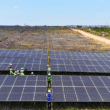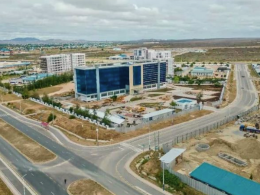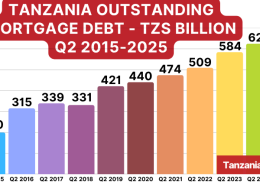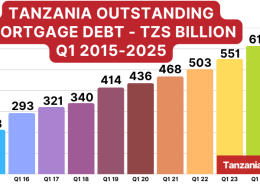TanzaniaInvest had the pleasure on interviewing Fred Msemwa, Chief Executive Officer of the Watumishi Housing Company (WHC), a government-owned property developer and a licensed fund manager established in 2013, responsible for management of the WHC Real Estate Investment Trust (WHC-REIT).
WHC-REIT was licensed by the Capital Market and Security Authority (CMSA) in 2015 and became the first fully-fledged REIT to be established in Tanzania and East Africa.
As a property developer, WHC-REIT is the main implementer of the Tanzania Public Servant Housing Scheme tasked with building of 50,000 housing units in five phases commencing from FY 2014/2015.
Unit holders of WHC-REIT include seven public institutions namely; PPF Pensions Funds, National Social Security Fund (NSSF), Public Service Pension Fund (PSPF), LAPF Pensions Fund and GEPF Pension Fund, the National Health Insurance Fund (NHIF) and National Housing Corporation (NHC).
Msemwa and TanzaniaInvest discuss WHC’s ambitions, the current state of the mortgage markets in Tanzania and the upcoming real estate projects open for investments.
TanzaniaInvest: Watumishi Housing Company (WHC) was established by the government of Tanzania in 2013 as a real estate developer. Why such need when there are already other government-owned property developers like the National Housing Corporation (NHC) and the Tanzania Building Agency (TBA)?
Fred Msemwa: Watumishi Housing Company is a public entity which was established in 2013 to perform three key functions: provide affordable homes for the general public, to be a real estate fund management company and provide education to the general public, on how to access funds using mortgages.
Affordability and the market segment we address are what differentiate Watumishi Housing Company from the rest of Tanzanian real estate developers.
In the context of the income levels of the people of this country, particularly the working class, and if you go further, the public servants, affordability in this context would mean houses with prices ranging from USD 10,000 to USD 40,000, with the majority of the prospective buyers fitting in USD 20,000.
Clearly, WHC differentiates itself from the rest of developers because we are focusing on that lower segment which, in terms of units needed, is the biggest segment.
Specifically, WHC was tasked to implement the Public Servant Housing Scheme first, because it was not easy to start with the entire market, given the fact that the mortgage Industry is in its infancy in Tanzania.
The lessons that we pick from what we are doing now for public servant can be replicated by other developers who can take our model and apply it in the rest of the market.
Our second function is to be a Fund Management Company.
Developing properties requires a lot of money; and sometimes, you have to have the capacity to raise money in other to finance your projects.
WHC fund was established as a special purpose vehicle that operates as a Real Estate Investment Trust.
That legal arrangement allows it to raise money from small investors who can pull up their resources.
Such resources can be then used to build homes, homes can be sold, and then we reinvest revenues to building new homes.
WHC’s third function is relating to the other two functions, as we are also tasked to undertake public awareness – providing education to the general public, particularly public servants, in terms of how they can acquire or access funds using mortgages.
This is a new concept in Tanzania and the people need to be taught on how they can acquire homes through mortgage and not build on their own.
The practice now is that more than 95% of the people are building houses on their own, on incremental basis from their personal savings.
They build slowly and it can take 3-15 years to do so, and that is more costly to the economy and to the people themselves.
So, if they are able to get mortgage, they can shorten the time at which they can live in decent houses.
At the same time, that can formalize the sector in a manner than can increase the contribution of real estate in the national economy.
So it’s a matter of using a language that people can understand, and that’s what we are doing.
We have started a public awareness campaign and the initiative that we are doing is to impart people with basic financial skills to understand basic terms as far as mortgage is concerned.
TI: What is the current mortgage market like in Tanzania? Is it easy to access loans to buy houses?
FM: Mortgage finance are expensive in Tanzania. The biggest challenge that faces prospective homebuyers is the cost of finance or the rate at which they can borrow.
If you look at the market, the average mortgage’s interest rate in Tanzania is 16% to 20%+.
If you get a mortgage at a rate which is above 10%, it’s not the best in terms of the cost that you have to pay, given the salary levels of the people who are borrowing the homes and the duration that you have to service the loan.
So, we think that loan’s high interest rate is the single most hindrance to expanding the mortgage market.
If this issue is addressed, there will be no limit because homes can be bought easily.
The demand for homes in Tanzania is more than 3 million units.
TI: What is WHC doing to address the high interest rate of mortgages in Tanzania?
FM: We are focusing on how to put an affordable home loan arrangement, where people can be able to buy or borrow at interest rates that do not pose any financial burden to them.
Currently, unit holders of Watumishi Housing Company enjoy better mortgage rates with banks, lower than the market average, because WHC guarantees for them. In case of anything bad happening, we would take care of the loss.
Unfortunately, even the negotiated interest rate is not low enough to attain the level of affordability that we need: we have managed to secure mortgages at 14%-16% but we aim at 10%.
TI: How many affordable units you have developed so far and how many you do you aim at in the nearby future?
FM: This is WHC’s first year of operations. We started in 2014-15.
Most of the work that we had to do was to acquire land to start to construct homes.
So, most of the work that we did for the first 8 months was preparatory work.
This is the actual year [2016] that we have rolled out the first projects, with a plan to build 1,000 houses.
As we speak, we have 800 units under construction but we have received more than 1,500 applications.
In terms of future plans, we have a 5-phase plan which requires us to deliver 50,000 units.
TI: What are WHC current housing projects open for investment?
FM: We have a satellite city coming up at Kibaha, just 30 kilometres from Dar Es Salaam. With 1,000 homes, which is a customer base of 5,000 people.
Another planned city will be developed in USA-River in Arusha where we will undertake mix-used development comprising of homes for the low end income earner as well as other social amenities.
These represent opportunities for investors who can put up commercial and retail space or banks.
TI: WHC has its own Real Estate Investment Trust (REIT). Who can invest in it?
FM: Because the REIT concept is new in Eastern and Central Africa, we had to have a base on which people can then learn that this can work before we open it to investors.
Initially, we started with WHC shareholders [Tanzania’s government pension funds], who bought units for the first time.
That means WHC-REIT is a closed fund, in a manner that the general public cannot access these units.
But the closure will last for only 3 years, and we are now in the second year.
So in one year from now WHC-REIT units will be offloaded at the Dar Es Salaam Stock Exchange (DSE), when the general public will be able to buy and sell units.
From that point on, it would be easier to expand the capital base and even foreign investors will be able to take part in this lucrative business.
TI: What would you say to foreign investors that are interested in real estate in Tanzania but still have a perception of Africa being a risky region?
FM: Investors should know that Africa is not one country. Africa has more than 50 countries and each country has got its aspects that you may wish to understand in terms of political and economic risk, which is different from one country to another.
There are countries in Africa that are stable, where people prefer to invest.
Tanzania is one of the countries which has registered political stability for over fifty years, and a number of indicators show that we are on the right track in terms of economic growth.
If you look at Tanzania’s demographic, it shows a promising future with a demand for homes which is close to 3 million.
That demand cannot be satisfied by public entities alone like WHC. This is the job of everybody.
So, the doors are open for other developers to come, and the rewards are guaranteed because of the political stability Tanzania enjoys.











